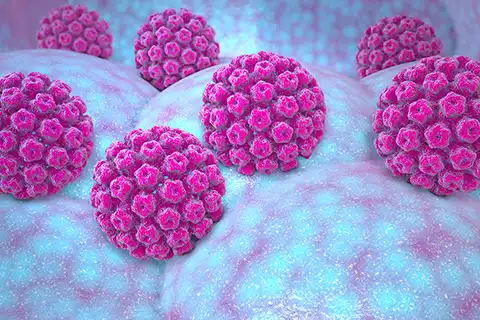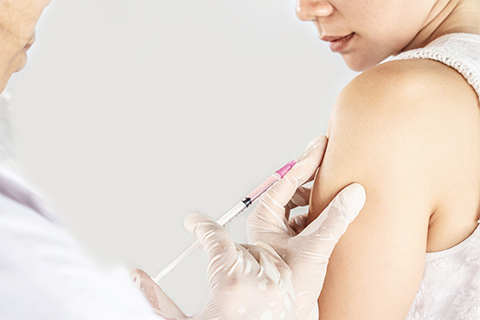Annual Gyn Exam
A pelvic exam with or without a Pap test should occur annually. Most young women undergo their first routine annual exam between age 18 and 21 or when they become sexually active, whichever occurs first.
HPV (human papillomavirus)
HPV is a common virus that infects the skin and mucous membranes. There are about 30 types of HPV that are spread through genital contact (typically sexual intercourse). Around half are “low risk” types and can cause genital warts. The remainder are “high-risk” types of HPV that can cause cervical cancer.
It is estimated that 80 percent of all women will acquire one or more types of “genital” HPV at some point in their lives. Most of the time, the body’s immune-defense system fights off or suppresses the HPV virus before it can cause problems. It is only when the infection persists that it can cause cells on the cervix to become abnormal and possibly cancerous. For these reasons, we start testing for persistent HPV infection in women over age 30.

Genital infection with the most common types of HPV can be prevented with the HPV vaccine. Vaccination is most effective if administered before a woman is sexually active. However, sexual activity does not mean it is too late to get the vaccine. Thevaccine does not protect against all types of HPV that can cause cervical cancer. It is important to get a regular Pap test and – if you’re over 30 – an HPV test, even if you’ve been vaccinated. A Pap test can identify abnormal cells, and the HPV test detects the presence of most types of high-risk HPV. Working together, they help make sure abnormal cells are diagnosed and treated early.
Pap and HPV testing women under age 21-30
The American College of OB-GYN (ACOG) suggests that a woman obtain her first Pap test by age 21 regardless of age at first intercourse. Until the age of 30, women should receive a yearly Pap test at the time of their annual exam. In this age group, we only perform HPV testing on ASC-US Pap results. ASC-US is an inconclusive Pap test finding. It is not considered abnormal unless it is repetitive or is obtained along with a positive HPV screen. If testing shows they do not have HPV, a repeat Pap test is recommended in 12 months. If HPV is present, we recommend a colposcopy exam. Regardless of HPV results, any frankly abnormal Pap test should be evaluated by colposcopy.
Chlamydia testing for women under age 25
There is a high incidence of chlamydia in women under age 25. Despite the irreversible damage it can inflict on a reproductive system it is surprisingly asymptomatic. ACOG recommends annual chlamydia screening for all women under age 25.
Pap and HPV testing for women Age 30-65

HPV testing, looking for persistent infection, is beneficial for women 30 and older. A woman whose HPV test is negative and whose Pap test is normal does not need to be tested again for HPV for three years. You will still need an annual exam. If your Pap test is normal but the HPV test is positive, we recommend repeating both the Pap test and the HPV test in 12mos. If the HPV test is again positive or the Pap test is abnormal we will advise you to schedule a colposcopy with us. Any abnormal Pap test, at any point, regardless of the HPV result requires investigation with a colposcopy. ASC-US is an inconclusive Pap test finding. It is not considered abnormal unless it is repetitive or is obtained along with a positive HPV screen.
Outlined below are the recommendations for women age 30 and older.
| Normal Pap | Abnormal Pap | |
| HPV Negative | Annual Pap test optional. Re-screen for HPV every three years. Annual pelvic exam | Colposcopy. |
| HPV Positive | Repeat both the HPV and Pap tests in 12 months. If either test is abnormal at that time, have a colposcopy (a procedure in which the cervix is examined using a lighted magnifying device, often accompanied by the removal of tissue for analysis). | Colposcopy. |
Let's stay in touch
Our monthly newsletter keeps you up-to-date on healthy lifestyle, latest news, and our practice.




